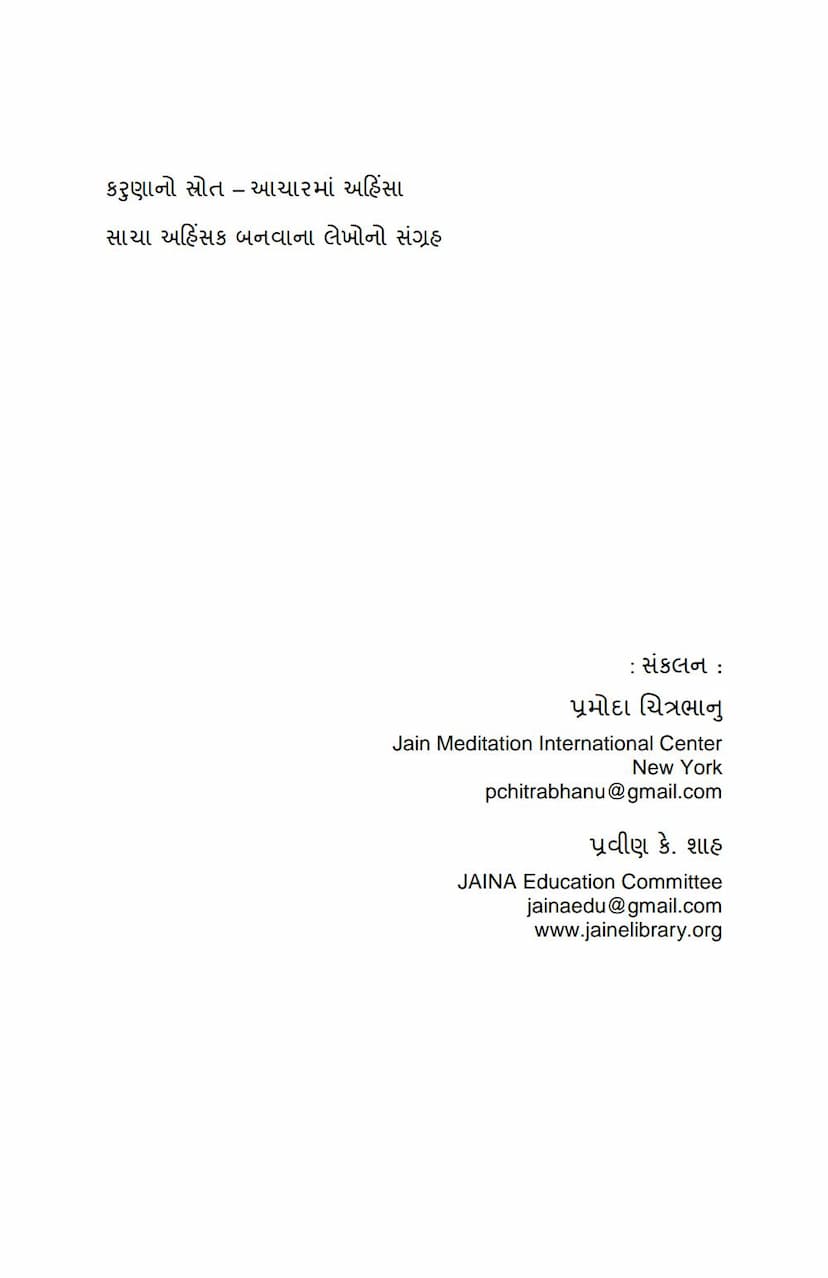JES 921G Karunano Srot Acharma Ahimsa Reference Book
Added to library: September 1, 2025

Summary
This Jain text, "Karunano Srot Acharma Ahimsa Reference Book" (The Source of Compassion - Ahimsa in Practice), compiled by Pramoda Chitrabhanu and Pravin K. Shah and published by the JAINA Education Committee, is a comprehensive collection of articles advocating for non-violence and compassion towards all living beings, particularly focusing on the ethical implications of animal product consumption and utilization.
Key Themes and Content:
The book's central message is that true Ahimsa (non-violence) extends beyond refraining from directly harming animals to questioning and renouncing practices that indirectly cause suffering and exploitation. It aims to educate readers about the often-hidden cruelties involved in the dairy industry, meat production, and the use of animal by-products.
Core Arguments and Topics Covered:
-
Dairy Industry Cruelty: The book strongly critiques the dairy industry, detailing the harsh realities faced by cows and buffaloes. This includes:
- Forced Insemination and Separation: Cows are repeatedly impregnated to maximize milk production, and their calves are forcibly separated shortly after birth, causing immense distress to both mother and offspring.
- Machine Milking and Injury: The use of milking machines, often left on for extended periods, causes pain and can lead to blood in the milk.
- Hormonal and Chemical Treatments: Cows are given hormones and antibiotics to increase milk yield and combat diseases, which are then passed into the milk.
- Early Slaughter: Cows are slaughtered after a few years of reduced milk production, far short of their natural lifespan of 15 years, to be processed into meat, pet food, or other by-products.
- Male Calves' Fate: Male calves are considered useless in the dairy industry and are often sent to slaughterhouses within days of birth.
- Veal Industry: The brutal practices of the veal industry, where calves are kept in dark, confined spaces and fed iron-deficient diets to produce tender meat, are also condemned.
- Indian Dairy Practices: The book highlights that even in India, where cows are often revered, the dairy industry inflicts similar suffering, with calves being sold for meat and cows being exploited until they are no longer productive.
- "Organic" Milk: Even organic dairy farms are not exempt from the inherent cruelty of the industry, as the fundamental practices of exploitation and early slaughter of calves and cows remain.
-
Meat Industry and Animal By-products: The book exposes the extensive utilization of every part of an animal after slaughter, emphasizing the sheer scale of animal slaughter and the myriad products derived from them, often for non-essential purposes like cosmetics, clothing, and even industrial materials. It details the grim mathematics of slaughterhouses and the transformation of animal waste into various consumer goods.
-
Other Animal Products and Practices:
- Silk: The production of silk is revealed to be a violent process where silkworms are killed in their cocoons to obtain the silk threads, thus violating Ahimsa.
- Pearls: The formation of pearls within oysters is described as a response to irritation and pain caused by foreign particles, highlighting the suffering of the living oyster.
- Eggs: The book refutes the idea that eggs are a vegetarian food, explaining that even unfertilized eggs are a product of a living being's reproductive cycle and that the conditions in commercial egg production are highly cruel.
- Silver Leaf (Vark): The production of silver leaf used in sweets and religious ceremonies involves the cruel process of using animal intestines to pound the silver into thin sheets.
-
Health and Environmental Impact: The book extensively discusses the adverse health effects of consuming animal products, including increased risk of osteoporosis, heart disease, cancer, and digestive issues. It also highlights the significant environmental impact of animal agriculture, including water consumption, land use, and greenhouse gas emissions.
-
Jain Religious Perspective: The book underscores the core Jain principle of Ahimsa, emphasizing that while some minimal harm to one-sensed beings (like plants) is permitted for sustenance, any harm to multi-sensed beings (animals) is strictly forbidden for householders and completely prohibited for monks. It calls for a re-evaluation of traditional religious practices that involve animal products, urging for a complete commitment to non-violence without compromise.
-
Alternatives and Solutions: The book advocates for a comprehensive vegan lifestyle, providing alternatives for dairy products (soy milk, nut milks), eggs, silk, wool, and other animal-derived ingredients in food, clothing, and cosmetics. It encourages readers to make conscious choices that align with Ahimsa and compassion.
-
Reader Testimonials: The latter part of the book includes feedback from readers who were moved by the "My Dairy Visit" article, many of whom decided to become vegan or vegetarian after learning about the cruelties involved.
In essence, "Karunano Srot Acharma Ahimsa" is a powerful call to action, urging readers to extend their practice of Ahimsa to all aspects of their lives, particularly their dietary choices, by becoming aware of the suffering inherent in animal product consumption and adopting a compassionate, plant-based lifestyle.